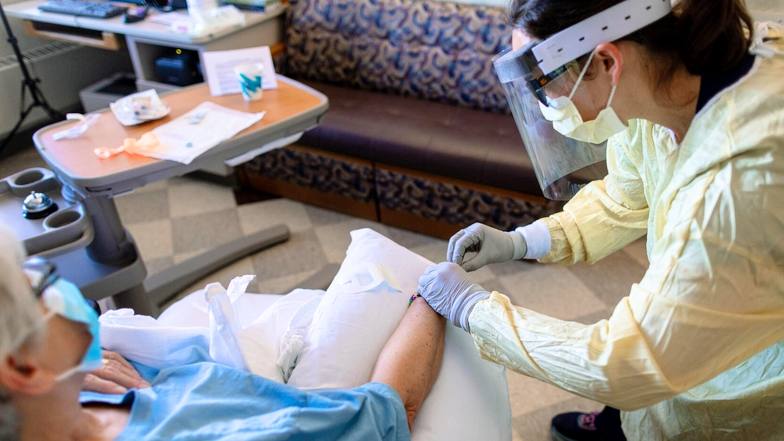
The U.S. continues to see new cases of COVID-19 infection, according to data provided by the Centers for Disease Control and Prevention. "The No. 1 strategy to prevent infection of the virus from spreading is to get everybody vaccinated," says Dr. Raymund Razonable, an infectious diseases physician at Mayo Clinic. "When a person is vaccinated, the risk of that person getting COVID is remarkably reduced."
Watch: Dr. Raymund Razonable talks about the treatment and prevention of COVID-19.
Journalists: Broadcast-quality soundbites are available in the downloads at the end of the post. Please courtesy: "Raymund Razonable, M.D./Infectious Diseases/Mayo Clinic.”
Most people who become sick with COVID-19 are unvaccinated, although there are instances where fully vaccinated people still get infected. These are referred to as breakthrough cases.
"If they do develop the so-called breakthrough infection, their ability to transmit is also reduced, because the number of times that they are positive is reduced," says Dr. Razonable. "And if multiple people are vaccinated, then it's basically reduction at the community level. That's what we want to have."
Good hygiene, avoiding large, public spaces and wearing a mask when in public remain other ways to help prevent the spread of COVID-19.
"Masking acts two ways," says Dr. Razonable. "No. 1, the person wearing the mask is less likely to transmit whatever virus he or she has, if that person is infected. And the person who is masked also has a lower chance of inhaling the viral particles that contain the virus, so less likely to get infected. It works both ways. It protects the person as well as the person that they are with."
For those who do become infected with COVID-19, there are a couple of treatments available.
"No. 1 is monoclonal antibodies. These are laboratory-made proteins that mimic the immune system to fight off the virus by blocking the entry of the virus into human cells. This has been shown to reduce hospitalization. This has been shown to reduce mortality, as well as reduce the chance that a person ends up in the intensive care unit. This is authorized for use during the early part of the disease when it's still mild to moderate in severity," Dr. Razonable says.
Remdesivir is another option. It is an IV antiviral medication given in a hospital setting and approved only in patients who are severely ill enough to be hospitalized.
Dr. Razonable says several antiviral pills are being tested, two of which have been shown to reduce hospitalization. These drugs await emergency use authorization from the Food and Drug Administration.
_______________________________
For the safety of its patients, staff and visitors, Mayo Clinic has strict masking policies in place. Anyone shown without a mask was either recorded prior to COVID-19 or recorded in a nonpatient care area where social distancing and other safety protocols were followed.
Information in this post was accurate at the time of its posting. Due to the fluid nature of the COVID-19 pandemic, scientific understanding, along with guidelines and recommendations, may have changed since the original publication date.
For more information and all your COVID-19 coverage, go to the Mayo Clinic News Network and mayoclinic.org.
Learn more about tracking COVID-19 and COVID-19 trends.








